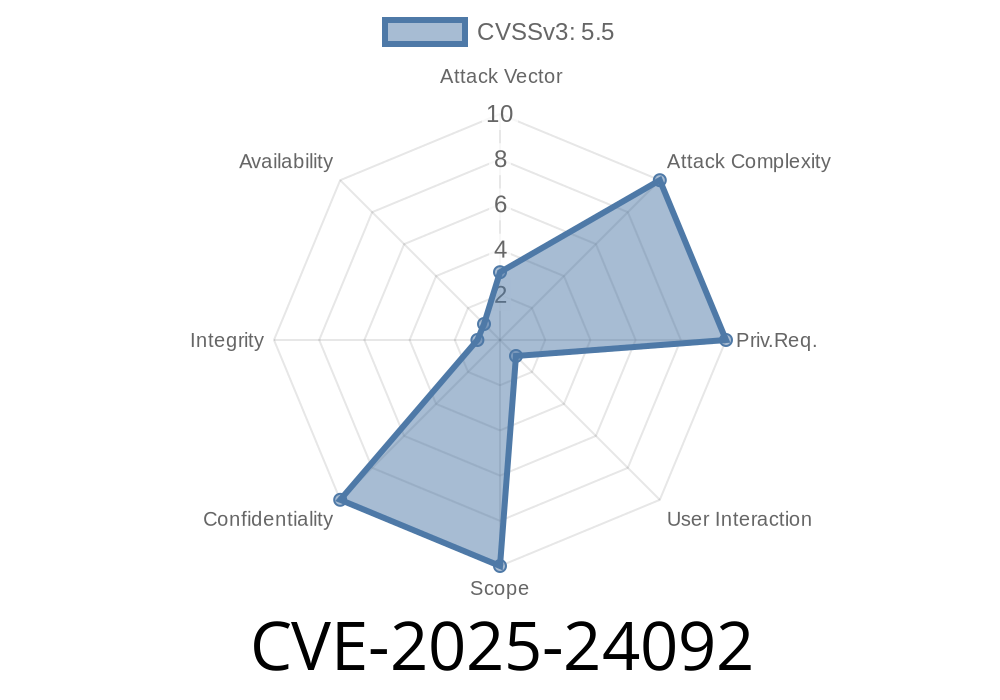In early 2025, Apple fixed a serious privacy issue impacting macOS systems, now tracked as CVE-2025-24092. This vulnerability could let malicious apps access sensitive location information without full user awareness. Here’s an exclusive breakdown of what happened, how it worked, and how Apple’s fix protects users.
What is CVE-2025-24092?
CVE-2025-24092 is a security bug found in macOS, including macOS Sonoma 14.7.2 and earlier, and the developer preview builds of macOS Sequoia. The flaw allowed apps to fetch location data from your device, side-stepping usual privacy checks.
Apple recognized the problem and improved how macOS protects location data for apps. The vulnerability was addressed and fully fixed in the following updates:
Why Is This Important?
Location data can reveal a lot about your personal life—like where you live, work, and play. Apps you don’t trust shouldn’t be able to see that information. Exploiting this flaw, a rogue app could capture your location and potentially share or sell it without your permission.
How Could an App Exploit This Vulnerability?
Prior to the fix, some system APIs meant for legitimate use would leak data if an app tried certain access patterns. For example, the app could make unauthorized calls to the CoreLocation framework.
Behind the scenes, make calls to CoreLocation APIs,
3. Get full location data—even if the user had denied or never granted this app location access in System Preferences.
Here’s a simplified pseudocode illustrating how an attacker might abuse the system
import CoreLocation
class StealthLocationGrabber: NSObject, CLLocationManagerDelegate {
let locationManager = CLLocationManager()
func tryToStealLocation() {
locationManager.delegate = self
// This might bypass intended permission checks in vulnerable macOS versions
locationManager.startUpdatingLocation()
// Normally, this should be blocked unless user granted access!
}
func locationManager(_ manager: CLLocationManager, didUpdateLocations locations: [CLLocation]) {
if let stolenLocation = locations.first {
print("Stolen Location: \(stolenLocation.coordinate.latitude), \(stolenLocation.coordinate.longitude)")
// Here, app could silently send location to remote server
}
}
}
*Above: In unpatched macOS, a malicious app could call for location updates and get them, even if you denied it location access. This is now blocked in new versions.*
Apple’s Fix: What Changed?
Apple addressed this by hardening the data access checks in CoreLocation and related frameworks (official security notes). Now, even if an app tries to access location data in indirect or creative ways, the system enforces user privacy:
Background Task Limits: Apps can no longer use sneaky background calls to peek at location data.
- Better Logging: Apple improved privacy logs to catch unusual location requests during app review.
Here’s a relevant code change concept (not official code, for educational use)
if !userHasGrantedLocationPermission(for: app) {
denyLocationRequest()
logAttempt(for: app)
}
Am I Protected?
If you’re using macOS Sequoia 15.3 or macOS Sonoma 14.7.3 (or later): Yes, you’re protected! The patch is installed and apps can’t pull this trick anymore.
If you’re on an earlier version: Update as soon as possible via System Preferences > Software Update.
Further Reading and References
- Apple Security Updates: June 2025
- CVE Record for CVE-2025-24092
- Understanding macOS App Permissions (Apple Docs)
Summary
CVE-2025-24092 is a now-fixed privacy bug where apps on macOS could steal your location. The fix is out, and keeping your Mac up to date makes sure your private places stay private. If you want to dive deeper, check out the links above for technical details.
Timeline
Published on: 01/27/2025 22:15:15 UTC
Last modified on: 03/18/2025 15:15:58 UTC
